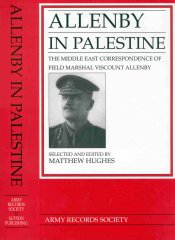Click here to view a text extract from this publication
 General Sir Edmund Allenby joined the Victorian army and spent his early years soldiering in Africa. After the South African War, 1899-1902, he was marked out for promotion, becoming a Major-General in 1909 and the Inspector General of Cavalry. He went on to fight in the First World War in France and Belgium as a divisional, corps and army commander before taking charge of the British-led expeditionary force in Palestine in June 1917. In 1919, in recognition of his services in Palestine, he was made a Field Marshal and Viscount, and became High Commissioner in Egypt.
General Sir Edmund Allenby joined the Victorian army and spent his early years soldiering in Africa. After the South African War, 1899-1902, he was marked out for promotion, becoming a Major-General in 1909 and the Inspector General of Cavalry. He went on to fight in the First World War in France and Belgium as a divisional, corps and army commander before taking charge of the British-led expeditionary force in Palestine in June 1917. In 1919, in recognition of his services in Palestine, he was made a Field Marshal and Viscount, and became High Commissioner in Egypt.In Palestine from 1917 to 1919, Allenby faced a number of challenges, ones which stretched his abilities as a field commander. Militarily, he took charge of a demoralised force facing determined, entrenched Turkish forces. Having boosted morale among his troops, Allenby, in two sets of battles in 1917 and 1918, captured Jerusalem before conquering all of Palestine, Lebanon and Syria. Politically Allenby liaised with allied Hashemite Arab forces and dealt with the delicate matter of the conflicting claims of Arabs, Zionists, French and Italians to occupied enemy territory.
This volume presents Allenby's Middle-Eastern military and political correspondence as he made the shift from general to colonial administrator. It covers and immensely significant twenty-eight month period during which British-led forces under Allenby conquered the Levant and then established the basic political framework for the contemporary Middle East. Allenby's correspondence for this period is of great benefit not just for military historians interested in the First World War in general and the Palestine theatre of operations in particular, but also for scholars examining the formation of the modern Middle East in the crucial transition period between the Ottoman Empire's collapse and the League of Nations Mandates for the Middle East agreed and established between 1919 and 1922.